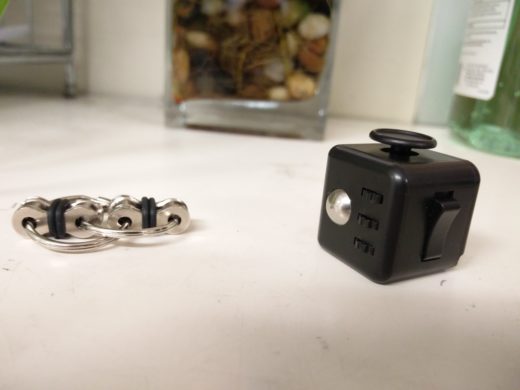
The fidget cube and fidget ring are just some of the popular fidget toys popping up around FVHS. Photo by Benjamin MinchStudents at FVHS were surveyed to see how long they spend sitting during the day. I spend an average of 4 hours 20 minutes in a desk, but
by Benjamin Minch, staff writer
Almost the entirety of the school day is spent sitting in a standardized desk, uncomfortable and cramped. This is why so many students at Fountain Valley High School (FVHS) and worldwide have reverted to fidgiting, which according to dicctionary.com is: “making small movements, especially of the hands and feet, through nervousness or impatience.”
some students such as Jon Geiger (‘18) spend upwards of 5 hours in a desk. Out of the ten students surveyed, most of them claim to spend around 4 hours in a desk and all of them find it uncomfortable.
Sitting has many consequences, with many calling it “the new smoking”. Muscular failure and high blood sugar can result from too much sitting, but one of the main consequences is blood flow.
Based on a study done at University of Missouri, fidgeting is the best way to combat the sitting scourge because it moves the muscles, helping blood flow to the legs. They measured blood flow in a stiff leg and one that moves slightly due to fidgeting and the second leg had significantly more blood flow despite the small movements.
Fidgeting can greatly reduce the risk of high blood pressure and atherosclerosis, which can lead to a heart attack. Fidgeting has also been proven to burn calories and higher metabolism and also reduce risk of deadly diseases caused by sitting.
This is the perfect cure for stress in students’ lives and will ultimately help them later in life. But many students fail to recognize the benefits of fidgeting.
“I think fidgeting is really annoying and distracting,” said Cameron Nakashima (‘18). This opinion is shared among many other students and teachers as well. If these people were informed about the benefits of fidgeting, they may have different opinions.
Fidgeting is a necessity in school student’s lives that they don’t yet realize. 12 anonymous students including junior Daniel Sanders (‘18) were asked if they would fidget if they knew it helped their long-term health, and 10 of them said yes.
“Fidgeting sounds pretty good now that I know about the benefits. I don’t want to turn into a potato when I get older” said Sanders.
Studies have also shown that students who fidget are better focused and can listen to teachers for longer periods of time. This is an extremely useful task for college because of long lectures and the need for educational endurance.
Overall, fidgeting is a necessity among FVHS students, one that goes unnoticed because it is often seen as a distraction. I think teachers and students need to overlook the temporary annoyances of fidgeting and accept the long term health benefits that will cause less heart attacks in the future. Fidgeting is a tool that students can use to also better their focus and grit and should be widely enforced at FVHS.





